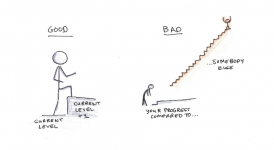The Loneliness and Shame of Feeling Invisible: How to Find Your Voice
A lot of people feel invisible. And for many different reasons.
What do I mean by "feeling invisible?" Like you don't matter. As if you aren't a vital part of things. As if you are being overlooked or seen only for what you can do instead of for who you are. You're an object - not a real human being. Shame can whisper to you that you're not worth as much as others - that you aren't acceptable, or welcome, or important. Your invisibility can begin to define you.
If it's part of depression, then some of that "invisibility" may be imagined or misperceived. Maybe you are important to people but you're taking their own lives being busy or not texting you back or whatever too personally. So that's an important distinction to make and you may want to check out your thinking with a therapist or someone you trust...
What to Do When You Feel Invisible
Take responsibility. It's too easy to blame others, and that never works. Even the people who are closest to you aren't responsible for how you feel. By taking responsibility, you can completely turn your perspective around. "My kids never call anymore" can be turned into "I'm glad my kids don't feel burdened by me."
A lot of people feel invisible. And for many different reasons.
What do I mean by "feeling invisible?" Like you don't matter. As if you aren't a vital part of things. As if you are being overlooked or seen only for what you can do instead of for who you are. You're an object - not a real human being. Shame can whisper to you that you're not worth as much as others - that you aren't acceptable, or welcome, or important. Your invisibility can begin to define you.
If it's part of depression, then some of that "invisibility" may be imagined or misperceived. Maybe you are important to people but you're taking their own lives being busy or not texting you back or whatever too personally. So that's an important distinction to make and you may want to check out your thinking with a therapist or someone you trust...
What to Do When You Feel Invisible
Take responsibility. It's too easy to blame others, and that never works. Even the people who are closest to you aren't responsible for how you feel. By taking responsibility, you can completely turn your perspective around. "My kids never call anymore" can be turned into "I'm glad my kids don't feel burdened by me."




